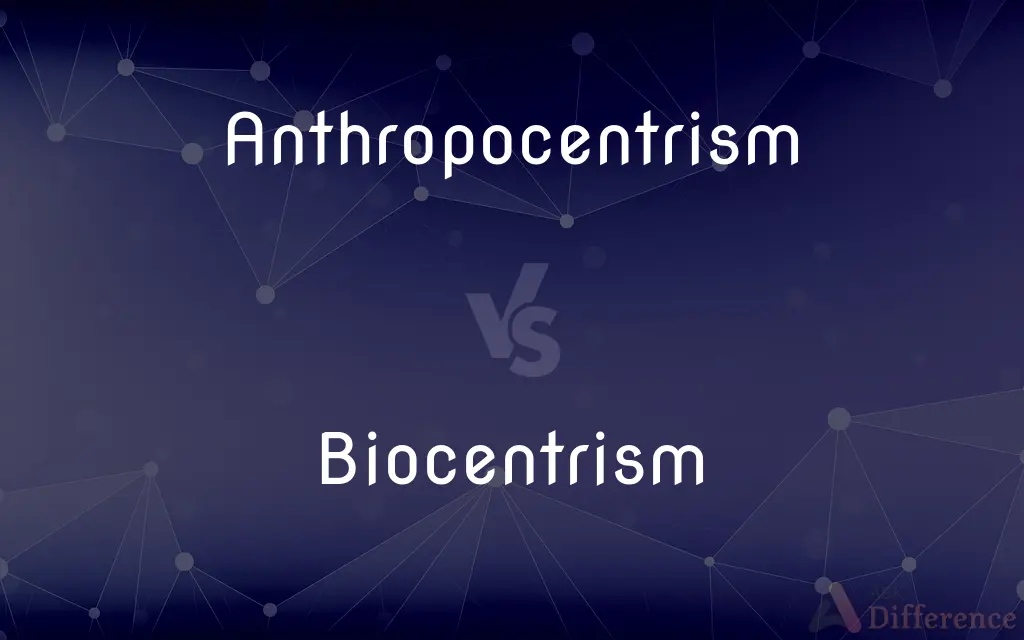Anthropocentrism vs. Biocentrism — What's the Difference?
By Tayyaba Rehman & Fiza Rafique — Published on February 10, 2024
Anthropocentrism places humans at the center of existence, valuing their needs and perspectives above other species, whereas Biocentrism views all life forms as having inherent value, advocating for equal consideration of all living beings.

Difference Between Anthropocentrism and Biocentrism
Table of Contents
ADVERTISEMENT
Key Differences
Anthropocentrism is the belief that human beings are the most important entity in the universe, influencing how we interact with the natural world. This viewpoint often leads to prioritizing human needs and interests above those of other species. Biocentrism, in contrast, argues that all living beings have intrinsic value and that human life is not inherently more valuable than other forms of life.
In an anthropocentric framework, environmental conservation is important primarily when it benefits human welfare, such as preserving water quality for drinking or forests for recreation. Biocentrism challenges this view by asserting that nature should be conserved for its own sake, not just for the resources or services it provides to humans.
Anthropocentrism can lead to practices and policies that significantly alter or harm the environment for the sake of human development, such as deforestation for agriculture or urban expansion. Biocentrism advocates for a more sustainable and ethical approach to development, one that considers the well-being of all life forms and the health of ecosystems.
Ethical debates surrounding issues like animal rights, habitat preservation, and climate change are often influenced by these perspectives. Anthropocentrism may justify animal testing or habitat destruction if it serves human ends, whereas biocentrism promotes the protection of animals and habitats as moral imperatives, regardless of direct human benefit.
The shift from anthropocentrism to biocentrism involves a fundamental change in how we view our place in the natural world. It requires recognizing the interconnectedness of all life and the responsibility we have to protect and preserve the diversity of life on Earth, challenging the notion that human interests should always take precedence.
ADVERTISEMENT
Comparison Chart
Core Belief
Humans are the central or most significant entities in the world.
All life has intrinsic value, not just humans.
Environmental Ethics
Conservation valued for human benefit.
Conservation essential for all life's intrinsic value.
View on Human Development
Prioritizes human needs, even at nature's expense.
Advocates sustainable development respecting all life.
Approach to Animal Rights
Animals' rights secondary to human interests.
Animals' rights equal to human rights.
Impact on Conservation
Often leads to exploiting resources.
Promotes preserving biodiversity for its own sake.
Compare with Definitions
Anthropocentrism
Anthropocentrism views humans as the most important beings.
Anthropocentrism often justifies using natural resources solely for human benefit.
Biocentrism
Biocentrism challenges human-centered views of the world.
Biocentrism leads to questioning practices like deforestation and animal testing.
Anthropocentrism
Anthropocentrism prioritizes human needs in ethical considerations.
Anthropocentrism shapes policies that prioritize economic growth over habitat preservation.
Biocentrism
Biocentrism asserts equal value for all living beings.
Biocentrism inspires laws that protect endangered species and their habitats.
Anthropocentrism
Anthropocentrism influences environmental policies to favor human interests.
Anthropocentric views lead to debates over land use and conservation.
Biocentrism
Biocentrism influences sustainable and ethical environmental practices.
Biocentrism advocates for green energy to reduce harm to all life forms.
Anthropocentrism
Anthropocentrism can justify human exploitation of the environment.
Anthropocentrism is evident in the clearing of forests for agricultural expansion.
Biocentrism
Biocentrism promotes equality among all life forms in ethical decision-making.
Biocentrism is at the heart of movements against animal cruelty.
Anthropocentrism
Anthropocentrism often overlooks the intrinsic value of non-human life.
Anthropocentrism discounts the suffering of animals in industrial farming.
Biocentrism
Biocentrism values biodiversity for its own sake, not just for human benefit.
Biocentrism drives conservation efforts in untouched wilderness areas.
Anthropocentrism
Regarding humans as the central element of the universe.
Biocentrism
An ethical viewpoint that extends inherent value to all non-human life, regardless of its sentience.
Anthropocentrism
Interpreting reality exclusively in terms of human values and experience.
Biocentrism
A cosmological theory viewing life and biology as central to being, reality, and the cosmos such that life creates the universe rather than the other way around.
Anthropocentrism
A viewpoint or theory that places human beings at the center of everything, giving preference to human beings above all other considerations.
Anthropocentrism
An inclination to evaluate reality exclusively in terms of human values.
Anthropocentrism
An inclination to evaluate reality exclusively in terms of human values
Common Curiosities
What is Biocentrism?
Biocentrism is the ethical viewpoint that all life deserves equal consideration and value.
Can Anthropocentrism lead to environmental degradation?
Yes, prioritizing human needs without considering environmental impact can lead to degradation.
What is Anthropocentrism?
Anthropocentrism is the belief that human beings are the most significant entities in the universe.
How does Anthropocentrism affect environmental policies?
Anthropocentrism often leads to policies that prioritize human benefit, sometimes at the expense of the environment.
How does Biocentrism influence conservation efforts?
Biocentrism promotes conservation for the intrinsic value of nature, beyond just human needs.
How do Anthropocentrism and Biocentrism view animal rights?
Anthropocentrism may see animal rights as secondary to human interests, while biocentrism views them as equal.
How does Biocentrism view human use of natural resources?
Biocentrism advocates for responsible and minimal use of resources, considering the impact on all life.
Is Anthropocentrism inherent in human nature?
Some argue it is, due to our survival instincts, but it can be challenged and moderated by ethical considerations.
Can Anthropocentrism justify animal testing?
From an anthropocentric perspective, animal testing can be justified if it serves human ends.
What challenges does Biocentrism face in a human-centered world?
Biocentrism challenges deeply ingrained anthropocentric views, requiring significant cultural and societal shifts.
Does Biocentrism oppose all human development?
No, biocentrism advocates for sustainable development that respects all forms of life.
Can Anthropocentrism and Biocentrism coexist in environmental ethics?
While they have differing core beliefs, some approaches try to integrate aspects of both for balanced solutions.
How can individuals adopt a more biocentric approach in daily life?
By considering the impact of their actions on all life forms and making choices that minimize harm and support sustainability.
Does Biocentrism have practical applications in policy-making?
Yes, it can guide policies towards more sustainable and equitable environmental practices.
How does Biocentrism affect our view of biodiversity?
Biocentrism leads to a greater appreciation and proactive protection of biodiversity.
Share Your Discovery

Previous Comparison
Johnson American Bulldog vs. Scott American Bulldog
Next Comparison
Positive Ion vs. Negative IonAuthor Spotlight
Written by
Tayyaba RehmanTayyaba Rehman is a distinguished writer, currently serving as a primary contributor to askdifference.com. As a researcher in semantics and etymology, Tayyaba's passion for the complexity of languages and their distinctions has found a perfect home on the platform. Tayyaba delves into the intricacies of language, distinguishing between commonly confused words and phrases, thereby providing clarity for readers worldwide.
Co-written by
Fiza RafiqueFiza Rafique is a skilled content writer at AskDifference.com, where she meticulously refines and enhances written pieces. Drawing from her vast editorial expertise, Fiza ensures clarity, accuracy, and precision in every article. Passionate about language, she continually seeks to elevate the quality of content for readers worldwide.













































